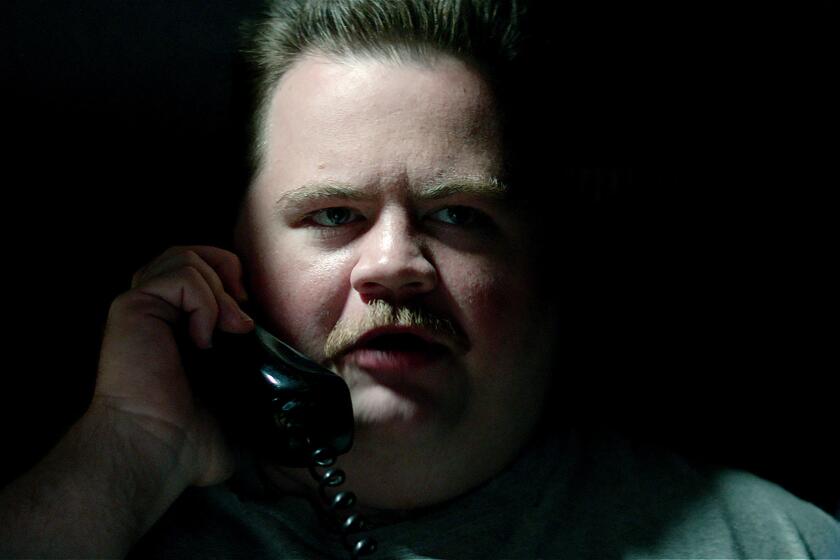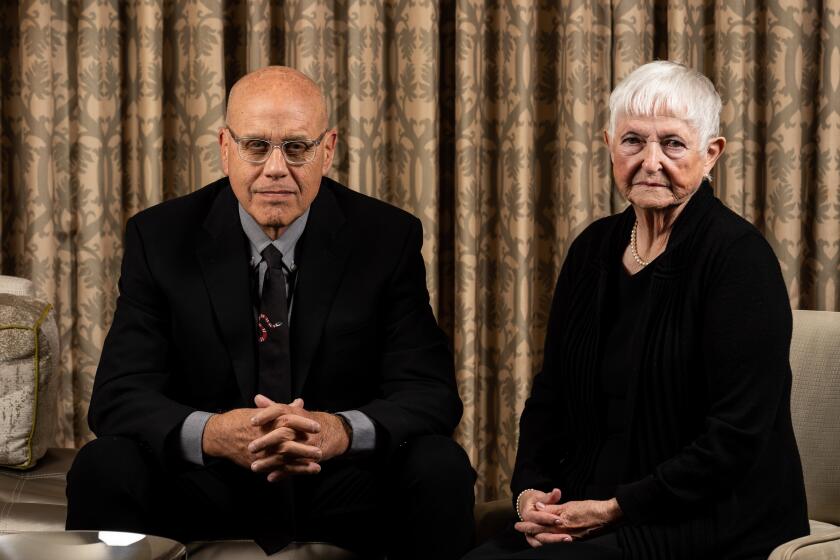Outcry over ‘Richard Jewell’ is proof that #MeToo is changing things
- Share via
It seems unlikely that Billy Ray wrote and Clint Eastwood directed “Richard Jewell” in order to test the state of sexism in post-#MeToo Hollywood. But that’s exactly what their film did. And lo and behold, it seems that things are not as bad as they once were.
Oh, in the actual film they are very bad. In the actual film, sexism is alive and well and multitasking, as it has been for so long, under the guise of character development and exposition. But this time, people are noticing. This time, people are not having it. There have been so many critiques, essays and takes that the media outrage churned up by “Richard Jewell” the movie, which opens in theaters Friday, is now almost as intense as the media circus that surrounded Richard Jewell the man. And for much the same reason.
“Richard Jewell,” Clint Eastwood’s new film set for Dec. 13, stars Paul Walter Hauser, Sam Rockwell, Kathy Bates, Jon Hamm and Olivia Wilde.
For those who have not read any of these pieces, “Richard Jewell” tells the based-on-actual-events story of an odd but endearing security guard (played by Paul Walter Hauser) whose life became a Kafka-esque nightmare after he identified a suspicious package at a concert at Atlanta’s Centennial Park during the 1996 Olympics.
While on-site police initially dismissed his demand that the package be treated as a potential danger, Jewell insisted — and when the pipe bomb it contained exploded, killing two and injuring 100, many concert-goers were out of harm’s way thanks to his efforts. For a few days, he was a national hero. Then the Atlanta Journal-Constitution ran a front page story by Kathy Scruggs revealing that Jewell was a person of interest in the FBI investigation, in part because he fit the profile of a “hero bomber.” Other outlets, at least one of which had previously been aware of the investigation’s focus, picked up on the story. Jewell became the center of a media maelstrom, publicly vilified for a crime with which he had not been officially charged and did not commit. It is a heartbreaking tale, historically and as presented in the film.
Clint Eastwood directs this fact-based drama about the security guard falsely accused in the Centennial Park bombing during the 1996 Olympics in Atlanta.
In Ray and Eastwood’s telling, however, the original sin of the story is not the FBI‘s latching onto Jewell as a prime suspect based on a profile — or even the Atlanta Journal-Constitution’s publication of an accurate if perhaps ill-advised front page piece explaining how he fit that profile. No, in the film, the original sin is clearly Scruggs’ conduct: arriving at the concert with angry disdain for the “soft” assignment, itching to find something “crime-y,” and surveying the hideous destruction with a prayer that the guy behind it will turn out to be “interesting” in some way.
Within days, having heard there is a person of interest, she sidles up to FBI Agent Tom Shaw (Jon Hamm) and seduces him in order to get him to reveal that person’s name. Which he does.
Shaw is also portrayed as having issues that might cloud his objective search for justice — he too is initially angry at the soft assignment of providing security at the concert, then at having a security guard save the day under his nose. He seems only too happy to make Jewell the prime suspect. Frankly it would have made more narrative sense if Shaw had leaked Jewell’s name to Scruggs because he couldn’t stand the fact that a “rent-a-cop” out-policed the FBI.
Shaw, by the way, is a composite, a fictional character, which gave Ray far greater latitude with his motivations than those of Scruggs, who is not.
Still, when faced with the expositional problem of how Scruggs got the scoop (Scruggs, who died in 2001, refused to reveal her sources, plural, even when faced with the threat of jail), Ray decided, based on nothing but years of sexist precedent, to have her sleep her way to success. You know, like so many women do.
Richard Jewell’s mother and former lawyer, and the stars who play them, on the new Clint Eastwood film about the wrongly accused 1996 Olympics bomber
In all likelihood, neither Ray nor Eastwood set out to smear Scruggs’ professional reputation. Ray recently told Deadline that he believes the Atlanta Journal-Constitution’s loud criticism and threats of a defamation suit over her depiction are simply an attempt to deflect outrage over the paper’s role in “destroying the life of a good man” and that he stands by “every word and assertion in the script.”
And indeed, the film is centered on Jewell, who absolutely suffered as the result of the FBI’s investigation being leaked to the press and the AJC’s decision to run it on the front page amid the incipient 24-hour news cycle (CNN is based in Atlanta). And they certainly aren’t the first filmmakers to caricature a reporter. In film and television, there are basically two kinds of journalists: the heroically dogged, dedicated to the truth at all costs (think “Spotlight,” “Veronica Guerin”) and the cravenly ambitious, driven by the need to get on the front page, also at all costs (“House of Cards” jezebel Zoe Barnes).
Scruggs is clearly cast as the latter, and since she is a female journalist, and female journalists are often depicted as sleeping with their sources, the narrative solution is obvious. No need to get into the weeds of cultivating sources or question why the FBI might be leaking a suspect’s name. Shaw is played by Jon Hamm! The reporter is a woman! Just make the transaction quick and dirty and move on to the real story of how unfairly Jewell was treated by the media.
“Richard Jewell,” Clint Eastwood’s new film set for Dec. 13, stars Paul Walter Hauser, Sam Rockwell, Kathy Bates, Jon Hamm and Olivia Wilde.
A few years ago, Ray and Eastwood probably would have been able to do just that, with little or no objection. Scruggs is portrayed as happy to sleep with her source, empowered even, and her choice is not seen as a big deal by any character in the film or by anyone making it. Wilde, too, defended the depiction of Scruggs and initially called out those who criticized it for “minimizing” the character and “misunderstanding feminism.”
After her remarks sparked a whole new level of uproar, Wilde clarified her position, tweeting that she believed the Scruggs and Shaw characters were involved in an ongoing sexual relationship and pointing out that she “did not have a say in how the film was ultimately crafted.” Which is true.
It’s also true that a few years ago, such a plot turn would not have sparked this level of outrage, calls for a boycott and demand for a public disclaimer that “Richard Jewell” now faces (none of which is expected to affect its performance at the box office, although it may lessen the film’s Oscar odds). A few years ago, a handful of critics might have noted, as early critics did, that it was an unfortunate choice in an otherwise powerful movie. Maybe a few female columnists, like me, would have flipped their exhausted lids and the caravan would have moved on.
“Just Mercy,” “Richard Jewell,” “The Irishman” and “Little Women” are among eight memorable books that made the leap to film in 2019.
But a lot has happened in the last few years. We’ve learned, to our horror, that many of the rumors involving powerful men and the women who slept with them were not proof of the men’s magnetism, nor of the women’s desire for advancement, but rather of sexual coercion and assault.
Including at Warner Bros., the studio behind “Richard Jewell.” Earlier this year, longtime entertainment chairman and CEO Kevin Tsujihara stepped down amid accusations that he promised opportunities to an aspiring actress with whom he’d had sexual relations, and then orchestrated auditions for her.
Ironically, “Richard Jewell” is premiering against “Bombshell,” another based-on-actual-events movie about the alleged abuse female journalists endured at Fox News under then-Chairman and CEO Roger Ailes, who resigned amid multiple accusations of sexual harassment in 2016. While the Ailes scandal did not have as great an impact on the culture as the accusations made against Harvey Weinstein a year later, his ouster (followed by Bill O’Reilly’s firing after it was revealed that Fox News had paid millions in five separate sexual harassment suits to protect him) signaled an end to powerful men being allowed to sexualize female subordinates.
“Bombshell” stars Charlize Theron and Nicole Kidman as Megyn Kelly and Gretchen Carlson, who accused former Fox News CEO Roger Ailes of sexual harassment.
If only our storytelling would catch up.
Any film or series that deals with journalism is going to face criticism for taking the same kinds of liberties regularly taken in depicting every profession — simply because it is journalists who write about said films and series — but there’s nothing wrong with artistic license, even with journalism, if it’s in service of a noble theme.
But the point of “Richard Jewell” is that anyone can have his or her life ruined by prejudiced perception and the spreading of a careless narrative, even a white male hero. Serving that theme means not adding scintillating fictional details just to scintillate and, more importantly, not perpetuating harmful stereotypes. Just because a man is overweight and desperately seeking affirmation doesn’t mean he can’t be a hero; just because a journalist is an ambitious, outspoken woman doesn’t mean she would use sex to get a scoop.
The outcry over Scruggs’ portrayal in “Richard Jewell” may be one of the most powerful proofs of change since the #MeToo movement began, because it isn’t just about the film’s smearing of one woman. It’s about a respected filmmaker’s casual perpetrating of a sexist stereotype that has ruined more careers and harmed many more lives than the media circus in Atlanta in 1996 ever did.
More to Read
The biggest entertainment stories
Get our big stories about Hollywood, film, television, music, arts, culture and more right in your inbox as soon as they publish.
You may occasionally receive promotional content from the Los Angeles Times.














